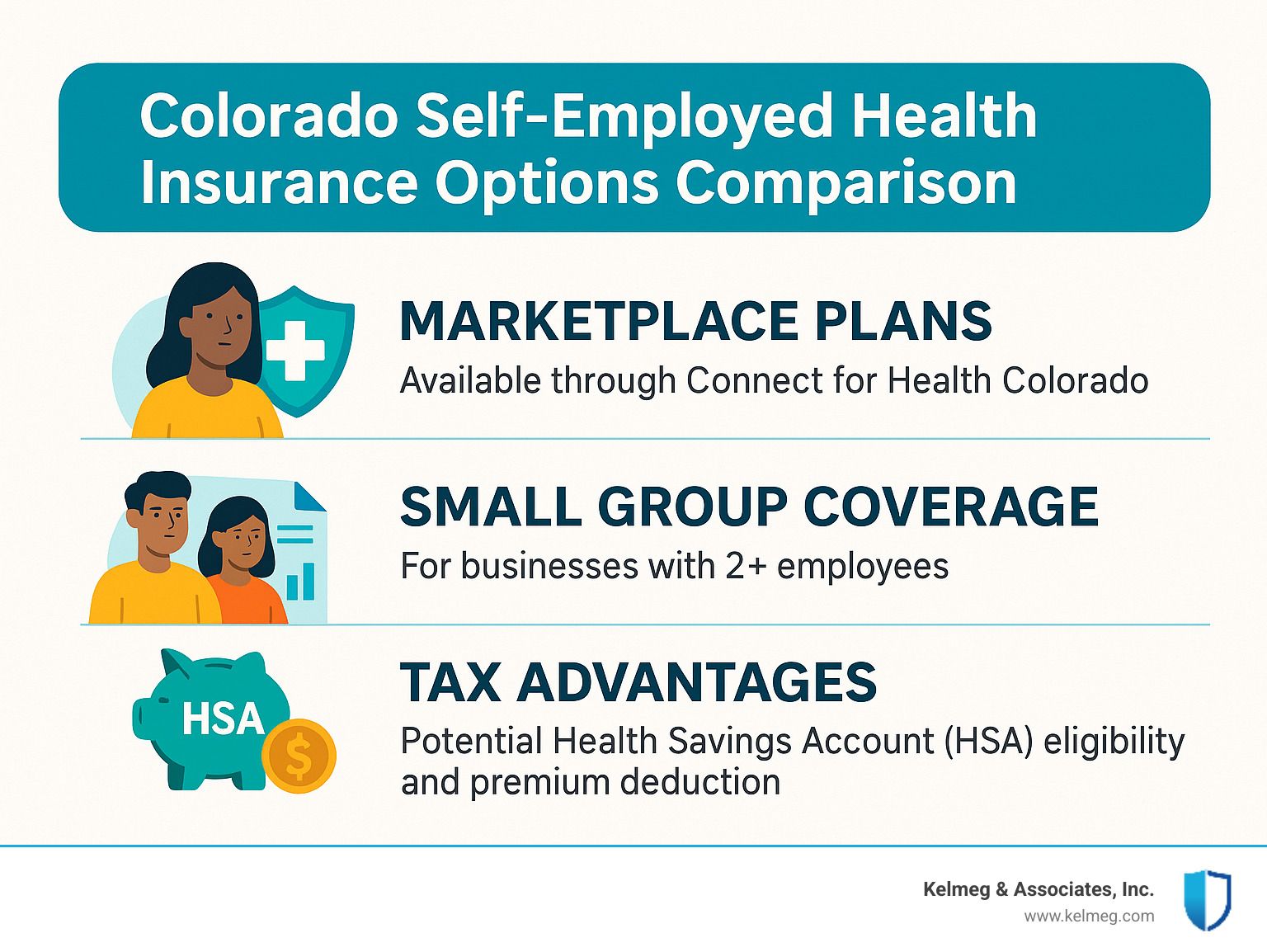Insuring Independence: Health Insurance Tips for Colorado's Self-Employed
Navigating Self-Employment Health Coverage in Colorado
Colorado self employed health insurance options include individual marketplace plans, small group coverage (if you have employees), or off-marketplace plans. Most self-employed individuals can find affordable coverage through Connect for Health Colorado with potential subsidies reducing monthly premiums to as low as $10.
- Individual Marketplace Plans: Available through Connect for Health Colorado
- Small Group Plans: For businesses with 2+ employees (one must be a non-spouse W-2 employee)
- Health Savings Account (HSA): Tax-advantaged option with high-deductible plans
- Colorado Option: Standardized plans with $0 copays for primary care and mental health visits
- Tax Benefits: Self-employed can deduct 100% of health insurance premiums
Working for yourself offers freedom and flexibility, but it also means taking full responsibility for your health insurance coverage. As a self-employed Coloradan, finding affordable, comprehensive health insurance might seem overwhelming amidst the maze of plans, carriers, and regulations.
The good news? You have more options than you might think. Whether you're a freelancer, consultant, independent contractor, or small business owner, Colorado offers several pathways to quality healthcare coverage that won't break the bank.
In fact, according to Connect for Health Colorado, 3 out of 5 customers enrolling through the marketplace are expected to find health insurance plans for $10 or less per month in 2025, with 81% qualifying for financial assistance.
I'm Kelsey Mackley, an insurance specialist at Kelmeg & Associates, Inc. with extensive experience helping self-employed Coloradans steer the complexities of Colorado self employed health insurance options to find coverage that protects both their health and financial wellbeing.

Am I Really Self-Employed? Colorado Rules & Qualifications
So you're your own boss – congratulations! But when it comes to health insurance, knowing your exact employment status isn't just a technicality – it's the difference between finding the right coverage and potentially missing out on significant benefits.
Let's clear up the confusion around self-employment in Colorado with some straight talk.
According to the IRS (not the most exciting folks, but they make the rules), you're generally considered self-employed if you're running your own show as a sole proprietor, operating as an independent contractor, participating in a business partnership, or generally working for yourself – even if it's just part-time. The key indicator? Those 1099 forms landing in your mailbox instead of W-2s.
Here in Colorado, our self-employed community is wonderfully diverse – from mountain town freelance writers to Denver tech consultants, gig economy drivers to small business owners making handcrafted goods.
Who Counts as Self-Employed under State & Federal Law?
When hunting for Colorado self employed health insurance, understanding your classification matters tremendously. True solo entrepreneurs (no employees) will shop for coverage through the individual marketplace at Connect for Health Colorado. This is where you'll find plans available to you as an individual or family.
"I can't tell you how many times clients come to us confused about their status," shares our senior advisor at Kelmeg. "They'll say, 'But I have an LLC,' or 'I work for multiple clients – does that still count?' The answer is yes! If you're receiving 1099s instead of W-2s, you're in the self-employed category."
For health insurance purposes, your Schedule C income becomes particularly important. This tax form shows your business profit after expenses – and that net income (not your gross revenue) determines what subsidies you might qualify for. Having your most recent tax transcript handy when exploring options can save you considerable time and confusion.
When Does a "Business of One" Become a Small Group?
This is where Colorado's rules get interesting – and where many self-employed folks get tripped up.
To qualify for small group health insurance in Colorado, you need:
- At least two people in your business
- At least one W-2 employee who isn't your spouse
- That employee must work at least 30 hours weekly
- Your business must call Colorado home
"The spouse rule catches many by surprise," our Boulder office manager often points out. "Couples running a business together frequently assume they qualify as a small group, but Colorado requires that non-spouse W-2 employee."
If you're flying solo or working just with your spouse, individual marketplace coverage is your path. But hiring even one qualifying employee opens doors to small group options, which sometimes offer different networks, benefit structures, and occasionally better pricing depending on your situation.
The good news? Whether you qualify as truly self-employed or as a small group, we can help steer both scenarios to find your optimal coverage solution.
Learn more about our small business health insurance services
Colorado Self Employed Health Insurance: Your Coverage Menu
When you're working for yourself in Colorado, choosing health insurance can feel like studying a restaurant menu in a foreign language. Let me walk you through your options in plain English, so you can find coverage that fits your health needs and budget.
Individual & Family Marketplace Plans
Most self-employed Coloradans find their health insurance through Connect for Health Colorado, our state's marketplace. Think of the metal tiers like different levels of coverage: Bronze plans have lower monthly payments but higher costs when you actually use healthcare. Silver plans strike a balance between premiums and out-of-pocket costs. Gold plans cost more monthly but less when you need care, while Platinum plans have the highest premiums but lowest costs at the doctor's office.
I've noticed that for most of my freelance clients, Silver plans often provide the best overall value. They hit that sweet spot between affordable premiums and reasonable coverage. Plus, they're the only plans eligible for extra savings through cost-sharing reductions if your income qualifies.
Every marketplace plan covers essential health benefits – preventive care, emergency services, hospital stays, prescriptions, maternity care, mental health services, and more. You don't need to create an account to get a quick estimate of what's available – just use the Quick Cost and Plan Finder tool to explore your options.
The Colorado Option Advantage
Colorado has introduced something pretty special with the Colorado Option. These standardized plans make shopping for Colorado self employed health insurance much simpler because all carriers offer identical benefits.
The Colorado Option stands out with some fantastic perks: $0 copays for primary care visits, mental health appointments, and prenatal/postnatal care. If you're managing diabetes, certain supplies come with no out-of-pocket costs. And instead of confusing percentage-based coinsurance, these plans use straightforward copays that make your costs more predictable.
"I used to spend hours comparing different plans," one of my self-employed clients in Fort Collins told me. "With the Colorado Option, I can focus on finding a plan with doctors I like rather than decoding benefit structures."
Want to dive deeper? Check out the detailed Colorado Option Overview for all the specifics.
Forming a Small Group as a Freelancer
Has your solo venture grown to include employees? You might qualify for small group coverage, which applies to businesses with 2-100 employees in Colorado. The rules are specific: you need at least one non-spouse W-2 employee working at least 30 hours weekly, and you must contribute at least $125/month toward each enrolled employee's premium.
Small group plans let you subsidize employee insurance costs (a great recruiting tool!), access different plan designs than what's on the individual market, and potentially qualify for small business healthcare tax credits. I've helped many freelancers make this transition as their businesses have grown, and they've found that offering health benefits gives them a competitive edge when hiring talent.
Short-Term & Supplemental Safety Nets
Life happens – maybe you're between coverage periods or looking to improve your primary insurance. Short-term health insurance can provide up to 4 months of coverage during any 12-month period, but remember, these plans typically don't cover pre-existing conditions and don't qualify for the same tax advantages as ACA-compliant plans.
You might also consider supplemental options like accident insurance for unexpected injuries, critical illness insurance that provides a lump sum for serious diagnoses, standalone dental and vision coverage, or international travel medical insurance if your self-employment takes you abroad.
These options should complement, not replace, comprehensive coverage. Think of them as the side dishes to your main course of health insurance.
Health Savings Accounts for the Self-Employed
If there's a secret weapon in the self-employed health insurance arsenal, it might be the Health Savings Account (HSA). These accounts pair with high-deductible health plans and offer a triple tax advantage: tax-deductible contributions, tax-free growth, and tax-free withdrawals for qualified medical expenses.
For freelancers with unpredictable income (and who doesn't have those ups and downs?), HSAs provide flexibility. You can contribute more during profitable months and tap those funds during slower periods. Plus, after age 65, you can withdraw funds for any purpose, paying only income tax – making it a stealth retirement account too.
Finding Colorado Self Employed Health Insurance on the Marketplace
Colorado self employed health insurance through the marketplace offers significant advantages, especially if your income falls between 138% and 400% of the Federal Poverty Level (and sometimes higher, thanks to recent legislation). You might qualify for premium tax credits that lower your monthly payments and cost-sharing reductions that decrease your out-of-pocket expenses on Silver plans.
The marketplace guarantees coverage regardless of pre-existing conditions and ensures you get standardized essential benefits. For many of my self-employed clients, this route provides the most affordable, comprehensive coverage.
Buying Colorado Self Employed Health Insurance Off-Exchange
Sometimes, the best option isn't on the marketplace. If your income is too high for subsidies, you prefer specific carriers not available on the exchange, or you're looking for certain provider networks, off-exchange plans might be worth exploring.
I always compare both on- and off-exchange options for my self-employed clients. For higher-income professionals especially, the math sometimes works out better with direct-to-carrier plans. It's like knowing about the secret menu at your favorite restaurant – sometimes the best options aren't on the standard menu.
At Kelmeg & Associates, we've helped hundreds of self-employed Coloradans steer these choices. The right option depends on your specific situation – your income, health needs, risk tolerance, and preferences. The good news? You have more choices than ever before.
Enrollment Windows: Open, Special & No-Deadline Programs
Timing is everything when it comes to getting covered. As a self-employed Coloradan, knowing exactly when you can enroll in health insurance can save you from gaps in coverage and unexpected medical bills.
Open Enrollment Essentials
Every fall, Connect for Health Colorado opens its virtual doors for what we call the Open Enrollment Period. This window for Colorado self employed health insurance runs from November 1 to January 15 each year. But here's a crucial detail many miss: if you want your coverage to begin on January 1 (avoiding that nerve-wracking gap in protection), you need to complete your enrollment by December 15.
During these weeks, you have complete freedom to make changes. You can sign up for a brand new plan, switch to something that better fits your needs, or simply update your income information to make sure your subsidies are accurate.
"I always tell my freelance clients to treat Open Enrollment like an annual checkup for their insurance," says our Lafayette specialist. "Even if you think your current plan is working fine, take thirty minutes to review your options. Your health needs change, premiums shift, and new plans emerge every year that might be a better fit for your situation."
Special Enrollment Triggers for Independent Workers
Life doesn't always follow a neat November-to-January schedule. Fortunately, certain life events open a 60-day Special Enrollment Period window, allowing you to make changes outside the standard timeframe.
For the self-employed, these qualifying events can be particularly relevant. Leaving a job to start your own business? That loss of employer coverage triggers a special enrollment period. Moving your home office to a new ZIP code? That counts too. Significant income changes that affect your subsidy eligibility are especially common for freelancers with fluctuating earnings.
"One of the most common scenarios we see is someone leaving their corporate job to become a consultant or freelancer," our Denver advisor notes. "That transition from employer coverage to self-employed status opens a 60-day window to find individual coverage, which is crucial since you're simultaneously juggling all the other aspects of starting your business."
Other qualifying events include changes in household size (marriage, divorce, having a baby), gaining citizenship, or being released from incarceration. Each gives you that precious 60-day window to secure coverage.
Year-Round Programs Like FAMLI & Medicaid
Some valuable programs don't follow the standard enrollment calendar at all. These year-round options can be lifesavers for the self-employed:
Colorado's FAMLI program (Family and Medical Leave Insurance) allows self-employed individuals to opt in at any time by registering with the FAMLI Division. You'll pay quarterly premiums of 0.45% of your wages, but in return, you gain access to paid leave benefits – something traditionally employed workers take for granted but entrepreneurs often sacrifice. Just remember, this requires a three-year commitment once you opt in.
Medicaid and Child Health Plan Plus (CHP+) also allow year-round enrollment for those who meet the income requirements. These can be especially valuable for self-employed individuals just starting out or going through a lean period.
If your business has grown to include employees, you'll be happy to know that small group insurance can be established any month of the year – no need to wait for Open Enrollment.
"The flexibility of year-round programs can be a real advantage," explains our Boulder insurance specialist. "I worked with a web developer who had a medical emergency shortly after going freelance. Because we were able to immediately check his Medicaid eligibility outside of Open Enrollment, he avoided thousands in potential medical debt that could have sunk his new business before it even got off the ground."
Understanding these timing windows is one of the most important aspects of managing your Colorado self employed health insurance. Missing them can mean months without coverage – a risk no business owner should take.
Pay Less, Save More: Subsidies, Credits & Tax Breaks

Let's talk money—because being your own boss shouldn't mean emptying your wallet for health coverage. The good news? There's a buffet of financial helpers available for self-employed Coloradans.
Did you know that 81% of Coloradans qualify for financial assistance through the marketplace? Many of our clients are pleasantly surprised to learn they're paying an average premium of just $143 per month after subsidies kick in. Some even qualify for plans as low as $10 monthly!
Estimating Self-Employment Income Correctly
Picture this: you're filling out your marketplace application and reach the income question. As a self-employed person, you can't just look at a pay stub. You're trying to predict the future!
"Last week, a web designer client called in a panic because she'd accidentally entered her gross revenue instead of her net profit," shares our Denver advisor. "That simple mistake would have cost her thousands in lost subsidies."
When estimating your income, think net profit, not gross revenue. Take your anticipated business income and subtract all those legitimate business expenses—office rent, software subscriptions, professional memberships, and so on.
Start by reviewing your past tax returns for patterns. Had a few years of steady growth? Factor that in. Expecting a big new client? Include that too. But be realistic—both overly optimistic and overly pessimistic projections can hurt you financially.
You can (and should) update your marketplace account if your income shifts significantly. A good rule of thumb is to report changes expected to last more than a month. You can easily obtain your IRS transcript if you need documentation to verify previous income.
Deducting Your Premiums & HSA Contributions
Here's a beautiful tax benefit many self-employed folks miss: you can deduct 100% of your health insurance premiums as an "above-the-line" deduction on your taxes. This isn't itemized—it reduces your adjusted gross income directly.
"I remember when a freelance photographer realized she could deduct her entire family's premium," recalls our Boulder tax specialist. "Her face lit up like she'd just booked a celebrity wedding. That $15,000 deduction dropped her into a lower tax bracket!"
This works for most Colorado self employed health insurance plans, including marketplace coverage (except catastrophic plans), off-exchange plans, and even your dental and vision insurance. You'll claim it on Schedule 1 of your tax return.
If you've opted for a Health Savings Account (HSA), those contributions are also tax-deductible. For 2023, you can contribute up to $3,850 for individual coverage or $7,750 for family coverage. Over 55? Toss in an extra $1,000 as a catch-up contribution. This triple-tax-advantaged account lets you save pre-tax, grow your money tax-free, and withdraw funds tax-free for qualified medical expenses.
Leveraging the Colorado Small Group Tax Credit
If your one-person show has grown to include employees, don't miss this potential goldmine: the Small Business Health Care Tax Credit.
"This credit is like finding money in the pocket of pants you haven't worn in months," jokes our small business specialist. "It's yours, but you might not even know it exists."
To qualify, your business must have:
- Fewer than 25 full-time equivalent employees
- Average annual wages below $59,000 per employee
- You pay at least 50% of employee premium costs
The smaller your business, the bigger the potential credit—up to 50% of your premium contributions! For a growing business with a handful of employees, this can translate to thousands of dollars back in your pocket.
One of our clients, a small bakery owner with six employees, used this credit to offset nearly $7,000 in premium costs last year. That's a lot of dough saved (pun absolutely intended).
Whether you're a solo freelancer or running a small team, we're here to help you steer these financial opportunities. After all, every dollar saved on healthcare is a dollar you can reinvest in growing your business or—dare we suggest—taking a well-earned vacation.
Learn more about affordable health coverage in Colorado
What to Look For Beyond Price
While premiums often drive decisions, self-employed individuals should consider:
Provider Networks: Ensure your preferred doctors and facilities are in-network. This is especially important if you travel frequently for work.
Prescription Coverage: If you take regular medications, check the plan's formulary to ensure they're covered at affordable rates.
Mental Health Services: With the stresses of self-employment, robust mental health coverage can be crucial.
Telehealth Options: Virtual care can save time for busy entrepreneurs.
Out-of-State Coverage: Important for digital nomads or those who work across state lines.
"One of our freelance writer clients chose a slightly higher premium plan because it offered superior out-of-network coverage for when she travels," shares our Broomfield advisor. "That decision saved her thousands when she needed emergency care while at a conference in Florida."
Why 62% of Enrollees Use a Broker
According to Connect for Health Colorado, 62% of customers enrolling in health insurance through the marketplace did so with the guidance of a certified broker. Why?
- Expert guidance at no additional cost
- Unbiased comparisons across carriers and plan types
- Help understanding the fine print
- Assistance with claims issues after enrollment
- Year-round support for questions and concerns
"Our clients tell us that having someone translate insurance jargon into plain English is invaluable," notes our team. "We help them understand what they're buying before they commit."
Contact a local expert at Kelmeg & Associates
What If Your Income or Household Changes Mid-Year?

Let's face it – one of the most challenging aspects of self-employment is the roller coaster of income and life changes that can happen throughout the year. When your financial situation is as dynamic as your business, knowing how to handle these shifts becomes crucial for your health insurance coverage.
Reporting Income Swings Quickly
The unpredictable nature of freelance work means your income projections might not always match reality. Maybe you landed that dream client or perhaps a major project fell through – either way, these changes can significantly impact your subsidy eligibility.
"Last year, a photographer client of ours had a much better year than expected – booking three major weddings in one month that completely changed her annual income," shares our Adams County advisor. "By reporting her income increase promptly, she avoided what would have been a substantial tax bill at year-end."
The 30-day reporting rule isn't just a suggestion – it's your financial safeguard. When your income increases, reporting within this window helps you avoid potentially painful tax penalties when you file. Conversely, if your business hits a rough patch and your income drops, reporting this change could qualify you for higher subsidies right when you need them most.
Making these updates is straightforward – you can log into your Connect for Health Colorado account online or give them a call. Advanced Premium Tax Credits (APTC) are reconciled when you file taxes. If you received more than you qualified for, you'll need to repay the difference; if you received less than you were eligible for, you'll get the additional amount as a tax refund.
Adding Employees to Your Business
That moment when your solo venture grows enough to bring on help is exciting – but it also triggers important insurance considerations. When you hire your first employee, you're no longer just looking at Colorado self employed health insurance for yourself – you're potentially entering small group territory.
If your new hire is a W-2 employee (not your spouse) working at least 30 hours weekly, you may now qualify for small group coverage. This transition requires setting up proper payroll systems, establishing W-2 reporting procedures, and notifying your marketplace account of this significant change in circumstances.
"Many of our clients don't realize that adding just one qualifying employee opens the door to entirely different insurance options," notes our small business specialist. "We've helped countless entrepreneurs steer this transition as their businesses grow, often finding that offering health benefits becomes a powerful tool for attracting and retaining talent in competitive industries."
The shift from individual to small group coverage isn't just a paperwork change – it represents a milestone in your business journey and potentially offers new advantages for coverage and costs.
Aging Off Parents' Plan or Turning 65
Life's major milestones often trigger insurance transitions, and two significant age-related events require special attention.
When you turn 26, you can no longer remain on a parent's health plan – a change that automatically qualifies you for a Special Enrollment Period. This gives you 60 days to secure your own coverage without waiting for the annual Open Enrollment Period. For young entrepreneurs just launching their self-employed careers, this transition often coincides with the beginning of their independent insurance journey.
At the other end of the spectrum, turning 65 brings Medicare eligibility – a completely different healthcare system with its own enrollment periods, coverage options, and coordination requirements if you're still working.
"Planning ahead for these transitions is absolutely crucial," advises our Medicare specialist. "I've seen too many self-employed individuals miss important enrollment windows or make costly coverage mistakes because they didn't understand how these age milestones would affect their insurance options."
For those approaching these transitions, working with an experienced broker can help ensure you understand all your options and timing considerations, avoiding coverage gaps or unnecessary expenses during these important life changes.
At Kelmeg & Associates, we specialize in helping self-employed Coloradans steer these transitions smoothly, ensuring you maintain appropriate coverage regardless of how your income, business, or personal life evolves throughout the year.
Frequently Asked Questions about Colorado Self Employed Health Insurance
Can I deduct 100% of my health insurance premiums if I'm self-employed?
Absolutely! This is one of the biggest financial perks of being your own boss. As a self-employed Coloradan, you can deduct 100% of your health insurance premiums as an "above-the-line" deduction on your tax return. This valuable tax benefit applies to qualified health plans covering yourself, your spouse, and any dependents.
There are just two caveats to keep in mind: First, the deduction can't exceed your net self-employment income (after expenses). Second, you lose eligibility if you could have enrolled in an employer-sponsored plan, such as coverage available through your spouse's job.
"I can't tell you how many self-employed clients are thrilled when they find this deduction," shares our Denver tax specialist. "It directly reduces your adjusted gross income, potentially putting you in a lower tax bracket and helping you qualify for other income-based tax benefits. It's like getting a discount on your health coverage just for being an entrepreneur."
How do I estimate fluctuating freelance income for subsidies?
This might be the trickiest part of securing Colorado self employed health insurance through the marketplace. When your income rises and falls like Colorado's spring weather, how do you provide an accurate estimate?
Start by reviewing your last two tax returns to establish your baseline income pattern. Then adjust for any known changes—new contracts you've secured, clients you've lost, or rate increases you've implemented. Don't forget to factor in seasonal patterns if your business has busy and slow periods.
"I work with a wedding photographer in Boulder whose income spikes dramatically during summer wedding season," explains our Connect for Health specialist. "We projected her annual income based on already-booked events and historical patterns from previous years. This gave her a much more accurate subsidy calculation than just guessing."
If you tend to have widely fluctuating income, it's generally better to be a bit conservative in your estimates. And remember—if your actual income changes by more than 10% during the year, update your marketplace account right away to avoid surprises at tax time.
What happens if I hire my first employee mid-year?
Congratulations on growing your business! Hiring your first W-2 employee (who isn't your spouse) is a significant milestone that opens new Colorado self employed health insurance doors.
Unlike the individual marketplace with its limited enrollment windows, small group health plans can start any month of the year. This means you don't have to wait for Open Enrollment to establish coverage for your growing team. You have several options:
You can continue your individual coverage until the next Open Enrollment period while exploring group options. Or you can immediately set up a small group plan for yourself and your employee(s). Some business owners also consider alternatives like an Individual Coverage Health Reimbursement Arrangement (ICHRA), which allows you to reimburse employees for their individual health insurance premiums.
"One of my clients was shocked to find she could set up a small group plan in April after hiring her first full-time assistant," recalls our small business specialist. "She had assumed she'd need to wait until November, but we had her group coverage up and running within weeks. It became a valuable retention tool for her growing marketing agency."
Establishing a small group plan requires some paperwork and employer contributions, but the flexibility and potential tax advantages make it worth considering once you've expanded beyond a solo operation.
Conclusion
Finding the right Colorado self employed health insurance solution might feel like searching for a needle in a haystack, but it doesn't have to be that way. Throughout this guide, we've explored the many avenues available to freelancers, consultants, and independent business owners across our beautiful state.
Whether you're just starting your entrepreneurial journey or you've been running your business for years, having reliable health coverage gives you the freedom to focus on what you do best without worrying about what might happen if you get sick or injured.
From marketplace plans with significant subsidies to tax-advantageous HSAs, from standardized Colorado Option plans to small group coverage as your business grows – self-employed Coloradans have more choices than ever before. And with 3 out of 5 marketplace customers finding plans for $10 or less per month, quality coverage might be more affordable than you think.
At Kelmeg & Associates, Inc., we've guided countless self-employed individuals through these decisions. Our team across Lafayette, Broomfield, Boulder, and Adams County understands the unique challenges you face. We know that your time is valuable, your income might fluctuate, and your business needs evolve as you grow.
What makes us different? We provide expert guidance at absolutely no additional cost to you. The insurance companies pay our commission, not you – so you get personalized advice without adding to your business expenses.
The independence of self-employment brings tremendous rewards, but it shouldn't come with the stress of figuring out health insurance alone. With the right coverage in place, you can pursue your passion with confidence, knowing that both your health and financial wellbeing are protected.
Ready to find the perfect health insurance solution for your self-employed lifestyle? Contact us today to learn more about group health insurance and individual coverage options in Colorado. We're here to help you steer the choices and find peace of mind.













